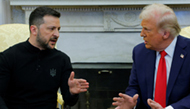▶ ROGER COHEN
SYRIA, for Israel, is a conundrum. The ousting of its despotic ruler, Bashar al-Assad, would remove Iran’s sole Arab ally and cut the Iranian conduit to its Lebanese proxy, Hezbollah. That is in Israel’s strategic interest. On the other hand Israel does not relish post-Assad chaos in Syria that allows sophisticated weaponry to fall into the hands of Al Qaeda splinter groups that love a vacuum and loathe Jews.
So it was interesting to hear Israel’s outgoing defense minister, Ehud Barak, speak in favor of Assad’s departure at the Munich Security Conference, saying he hoped to see it happen “imminently.” No option on Syria at this stage of its unraveling is without significant risk. But the worst course is the one President Obama and Western leaders have fallen into: Feeble paralysis most foul.
Israel has just bombed a Syrian convoy of antiaircraft weapons in a sortie that also hit a weapons research center — with no response from Assad beyond a belated grumble that this was “destabilizing” (that process seems advanced already). Just how much of a paper tiger Assad has become is one question raised by this attack. Another is whether the Western use of force will inevitably provoke a strong Syrian riposte; it seems not.
Syria, 22 months into its uprising, presents an unconscionable picture. Lakhdar Brahimi, the United Nations special representative for Syria, summed up the disaster in a leaked report to the Security Council on Jan. 29. He spoke of “cities that look like Berlin in 1945.” He decried the 60,000 killed, the massacres, the 700,000 refugees (rising to one million in a few months), the more than two million internally displaced and the tens of thousands of detainees. He warned of neighbors including Jordan and Lebanon collapsing under a further flood of refugees.
“I am sorry if I sound like an old, broken record,” Brahimi told the Security Council. “But I seriously don’t see where else one should start or end except in saying that things are bad and getting worse, the country is breaking up before everyone’s eyes; there is no military solution to this conflict — at least not one that will not destroy Syria completely and destroy also the nation of Syria; Syrians cannot themselves start a peace process, their neighbors are not able to help them; only the international community may help.”
But of course the “international community” — that awful phrase — is divided, with a Libya-burned Russia and an anti-intervention China deep in a blocking game. Brahimi wants a transitional government formed with “full executive powers” (this, he explained, is diplomatic speak for Assad having “no role in the transition”). The government would be the fruit of negotiations outside Syria between opposition representatives and a “strong civilian-military” government delegation. It would then oversee a democratic transition including elections and constitutional reform.
This sounds good but will not fly. I agree with Brahimi that there is no military solution. Syria, with its mosaic of faiths and ethnicities, requires political compromise to survive. That is the endgame. But this does not mean there is no military action that can advance the desired political result by bolstering the armed capacity of the Syrian opposition, leveling the military playing field, and hastening the departure of Assad essential for the birth of a new Syria. Assad the Alawite will not go until the balance of power is decisively against him.
The United States does not want to get dragged into another intractable Middle Eastern conflict. Americans are tired of war. My colleagues Michael Gordon and Mark Landler have revealed how Obama blocked an attempt last summer by Hillary Clinton to train and supply weapons to selected Syrian rebel groups.
Nor does Obama want to find himself in the business of helping Islamist extremists inherit a Syrian vacuum. The opposition coalition is divided and lacks credibility. But the net result of these concerns cannot be feckless drift as Syria burns. Senator John McCain was right to say here that, “We should be ashamed of our collective failure to come to the aid of the Syrian people” and to answer a question about how to break the impasse with two words: “American leadership.”
An inflection point has been reached. Inaction spurs the progressive radicalization of Syria, the further disintegration of the state, the intensification of Assad’s mass killings, and the chances of the conflict spilling out of Syria in sectarian mayhem. It squanders an opportunity to weaken Iran. This is not in the West’s interest. The agreement that Assad has to go is broad; a tacit understanding that it is inevitable exists in Moscow. The Turkish foreign minister, Ahmet Davutoglu, spluttered in justified incredulity at the notion the opposition would sit down with a regime that has slaughtered its own.
It is time to alter the Syrian balance of power enough to give political compromise a chance and Assad no option but departure. That means an aggressive program to train and arm the Free Syrian Army. It also means McCain’s call to use U.S. cruise missiles to destroy Assad’s aircraft on the runway is daily more persuasive.
스마터리빙
more [ 건강]
[ 건강]이제 혈관 건강도 챙기자!
[현대해운]우리 눈에 보이지 않기 때문에 혈관 건강을 챙기는 것은 결코 쉽지 않은데요. 여러분은 혈관 건강을 유지하기 위해 어떤 노력을 하시나요?
 [ 건강]
[ 건강]내 몸이 건강해지는 과일궁합
 [ 라이프]
[ 라이프]벌레야 물럿거라! 천연 해충제 만들기
 [ 건강]
[ 건강]혈압 낮추는데 좋은 식품
[현대해운]혈관 건강은 주로 노화가 진행되면서 지켜야 할 문제라고 인식되어 왔습니다. 최근 생활 패턴과 식생활의 변화로 혈관의 노화 진행이 빨라지고
사람·사람들
more많이 본 기사
- 마지막 토요일도 도심 집회… “내란 단죄” vs “윤 어게인”
- 쿠팡 ‘정부 반박’ 영문성명 미묘한 표현차… ‘잘못된 비난’ 부각
- “SD서 최고 활약 김하성, 2024시즌만큼만 쳐줘도 ATL 3승 더한다” ESPN 극찬
- 뉴욕시 폭설에 항공기 수천편 취소·지연 사태
- 보수 야당 “의원직 사퇴하고 법심판 받아야”…김병기에 총공세
- IS 확실했나…트럼프 ‘성탄절 나이지리아 폭격’ 갸우뚱
- 특검, ‘로저비비에’ 김기현 부부 기소…尹 뇌물 수사는 경찰로
- 황하나, 마약 도피 중 캄보디아서 출… 1
- “솔직히 자신은 없죠” 3루수 GG 송성문, 유격수도 아닌 외야라니... 생존 본능 발동할까
- 국힘 “신천지로 통일교 특검 물타기 안돼”…與 “성역없이 규명”
- 황하나, 남편 사망→캄보디아서 남친과 출산..귀국 후 구속 ‘파란만장’
- 올해 美 기업 파산신청 증가… “관세·고물가·고금리 원인”
- 오윤아 “子, 학교 떨어져 잘못 키웠나..방치 했나 싶어 눈물”
- 러, 젤렌스키 미국행 앞 대규모 공습…우크라도 러에 드론 공격
- “2025년 높이뛰기는 우상혁과 커의 무대” 세계육상연맹 조명... 우상혁도 “커와 계속 경쟁해야 해”
- “아동 수출국 오명 벗는다” 70년 만에 해외입양 중단
- “올해 최고 주목받은 테크 거물은 머스크 아닌 래리 엘리슨”
- “올해 최고 주목받은 테크 거물은 머스크 아닌 래리 엘리슨”
- 트럼프 “소말릴란드 아는 사람 있나?”…이스라엘 승인에 ‘NO’
- 이혁재가 또.. “빌려간 3억원 안 갚아” 사기 혐의로 피소
- 韓정부, 노란봉투법 해석 지침 공개… 하청 임금·근로조건 좌우하면 ‘진짜 사장’
- ‘서해 공무원 피격 은폐’ 혐의 서훈… 2
- ‘김건희에 로저비비에 선물’ 김기현 부인 특검 재출석…곧 기소
- [이지 사이언스] “온난화 막으려면 세계인구 44% 식단 바꿔야…문제는 소고기”
- ‘NCT 탈퇴’ 태일, 성폭행 혐의로 결국 감옥行..징역 3년 6개월 확정
- 곽도원, 음주운전 3년 만 복귀각..스토리제이컴퍼니 측 “미팅 했지만 계약 단계 아냐”
- 국제은값 폭등에 개인투자자들 銀투자 대거 유입
- 찰스 3세, 내년 방미 추진…트럼프에 英왕실 ‘매력 공세’될까
- 한파에 고드름이 주렁주렁… 서울 이번 겨울 첫 한파주의보
- 러, 트럼프-젤렌스키 종전회담 직전 … 1
- 쏟아지는 갑질·특혜 의혹… 버티는 김병기, 속 끓는 정청래
- ‘손흥민 감격의 첫 우승’ 올해 축구계 기적 톱8 선정 ‘선수로는 유일’
- 효연, 소녀시대 수입 서열 공개 “1위 나 아냐..윤아·태연이 더 벌어”
- “도시 빈민에 전한 성탄의 온기”
- 복음으로 세상 섬길 인재 배출
- 8시즌 뛰고 ML 역대 17위 “오타니 GOAT 될 것”, ML 역대 50인 선정
- 특검, 김건희 ‘금품 수수’ 무더기 기소… 뇌물 여부는 경찰 몫으로
- LA 등 서부에 사흘째 폭우…동부엔 폭설 예보
- 소싯적 ‘치기어린’ 주소 “굿바이”…지메일 주소변경기능 도입
- ‘정보 유출자 셀프 조사’ 경찰에 늦게 알린 쿠팡… 증거인멸 의혹
- ‘마약 혐의’ 남양유업 3세 황하나 구속… “증거인멸 우려”
- 특검, 尹에 징역 10년 구형… “법치주의·사법질서 파괴”
- 與 ‘통일교·신천지 특검법’ 발의… 野 “뜬금없다”
- ‘역대 최연소’ 백악관 대변인 레빗,… 1
- 쿠팡, 자체 조사결과 발표후 첫거래일 급등…뉴욕증시서 6%↑
- 한미장학재단에 3만달러 영구장학금 기탁
- “출생시민권은 사기”⋯ 이민 2세대 공격 초점 맞춘 트럼프
- 물류거점창고에 불체자 8만명 수용 추진
- 16세로 성장한 버클리 문학, 성대한 송년 파티
- “엔비디아, AI칩 스타트업 인수 아닌 기술 계약으로 규제 회피”
1/5지식톡

-
 미 육군 사관학교 West Poin…
0
미 육군 사관학교 West Poin…
0https://youtu.be/SxD8cEhNV6Q연락처:wpkapca@gmail.comJohn Choi: 714-716-6414West Point 합격증을 받으셨나요?미 육군사관학교 West Point 학부모 모…
-
 ☝️해외에서도 가능한 한국어 선생님…
0
☝️해외에서도 가능한 한국어 선생님…
0이 영상 하나면 충분합니다!♥️상담신청문의♥️☝️ 문의 폭주로 '선착순 상담'만 진행합니다.☎️ : 02-6213-9094✨카카오톡ID : @GOODEDU77 (@골뱅이 꼭 붙여주셔야합니다…
-
 테슬라 자동차 시트커버 장착
0
테슬라 자동차 시트커버 장착
0테슬라 시트커버, 사놓고 아직 못 씌우셨죠?장착이 생각보다 쉽지 않습니다.20년 경력 전문가에게 맡기세요 — 깔끔하고 딱 맞게 장착해드립니다!장착비용:앞좌석: $40뒷좌석: $60앞·뒷좌석 …
-
 식당용 부탄가스
0
식당용 부탄가스
0식당용 부탄가스 홀세일 합니다 로스앤젤레스 다운타운 픽업 가능 안녕 하세요?강아지 & 고양이 모든 애완동물 / 반려동물 식품 & 모든 애완동물/반려동물 관련 제품들 전문적으로 홀세일/취급하는 회사 입니다 100% …
-
 ACSL 국제 컴퓨터 과학 대회, …
0
ACSL 국제 컴퓨터 과학 대회, …
0웹사이트 : www.eduspot.co.kr 카카오톡 상담하기 : https://pf.kakao.com/_BEQWxb블로그 : https://blog.naver.com/eduspotmain안녕하세요, 에듀스팟입니다…
케이타운 1번가
오피니언

새해 더 중요해지는 노동법 준수

연말연시, 안전하고 차분하게
 캐슬린 파커 워싱턴포스트 칼럼니스트
캐슬린 파커 워싱턴포스트 칼럼니스트 [캐슬린 파커 칼럼] 지미 라이의 마지막 희망
 유경재 나성북부교회 담임목사
유경재 나성북부교회 담임목사 [한국춘추] 미국의 힘
 전병두 서북미수필가협회 회원
전병두 서북미수필가협회 회원 [금요단상] 비자 발급
 박일근 / 한국일보 수석논설위원
박일근 / 한국일보 수석논설위원 [지평선] 스님의 주례사
 신상철 / 고려대 고고미술사학과 교수
신상철 / 고려대 고고미술사학과 교수 [미술 다시보기] 신의 모습을 닮고자 한 예술가
 스티브 강 전 한인민주당협회 회장
스티브 강 전 한인민주당협회 회장 [스티브 강 ‘인사이드 미국’] 2026 중간선거: 트럼프 지지율 하락이 말해주는 것
 김홍일 케이유니콘인베스트먼트 대표
김홍일 케이유니콘인베스트먼트 대표 [기고] 안정의 기준은 어떻게 제도가 되었나
1/3지사별 뉴스

물류거점창고에 불체자 8만명 수용 추진
도널드 트럼프 행정부가 이민자 구금·추방을 효율화하기 위해 전국 물류거점 창고에 8만명 규모의 수용시설 확보를 추진한다고 24일 워싱턴 포스트…
‘학자금 상환’ 안하면 임금압류

“온 세상에 희망·평화의 빛 스며들길”
가자지구와 우크라이나에서의 전쟁, 고립과 불평등으로 세상이 어지러운 가운데 워싱턴 지역 각급 한인교회와 성당들이 성탄절을 맞아 일제히 예배와 …
“연말은 스트레스·새해 결심은 없다”

“올해 최고 주목받은 테크 거물은 머스크 아닌 래리 엘리슨”
올해 미국에서 가장 주목받은 기술업계 거물은 일론 머스크 테슬라 최고경영자(CEO)가 아닌 래리 엘리슨 오라클 창업자·회장이라고 블룸버그 통신…
[새해부터 이렇게 달라진다] 최저임금 또 오르고… 유급 병가는 더 확대

오늘 하루 이 창 열지 않음 닫기 



















































.png)


댓글 안에 당신의 성숙함도 담아 주세요.
'오늘의 한마디'는 기사에 대하여 자신의 생각을 말하고 남의 생각을 들으며 서로 다양한 의견을 나누는 공간입니다. 그러나 간혹 불건전한 내용을 올리시는 분들이 계셔서 건전한 인터넷문화 정착을 위해 아래와 같은 운영원칙을 적용합니다.
자체 모니터링을 통해 아래에 해당하는 내용이 포함된 댓글이 발견되면 예고없이 삭제 조치를 하겠습니다.
불건전한 댓글을 올리거나, 이름에 비속어 및 상대방의 불쾌감을 주는 단어를 사용, 유명인 또는 특정 일반인을 사칭하는 경우 이용에 대한 차단 제재를 받을 수 있습니다. 차단될 경우, 일주일간 댓글을 달수 없게 됩니다.
명예훼손, 개인정보 유출, 욕설 등 법률에 위반되는 댓글은 관계 법령에 의거 민형사상 처벌을 받을 수 있으니 이용에 주의를 부탁드립니다.
Close
x